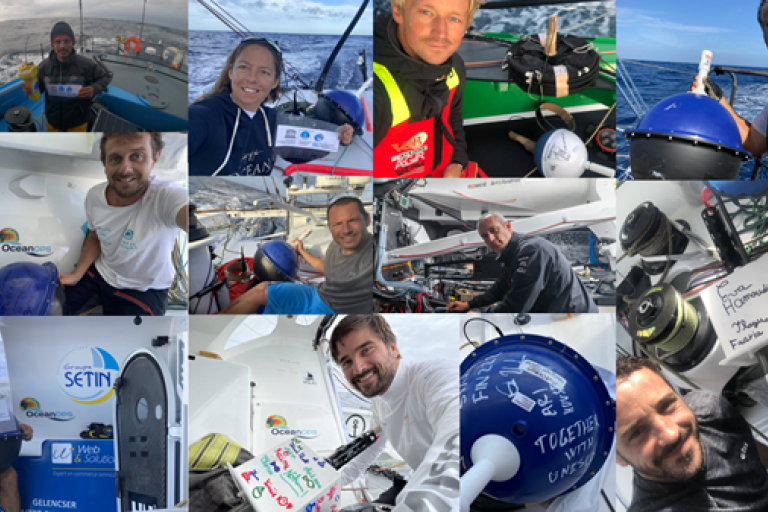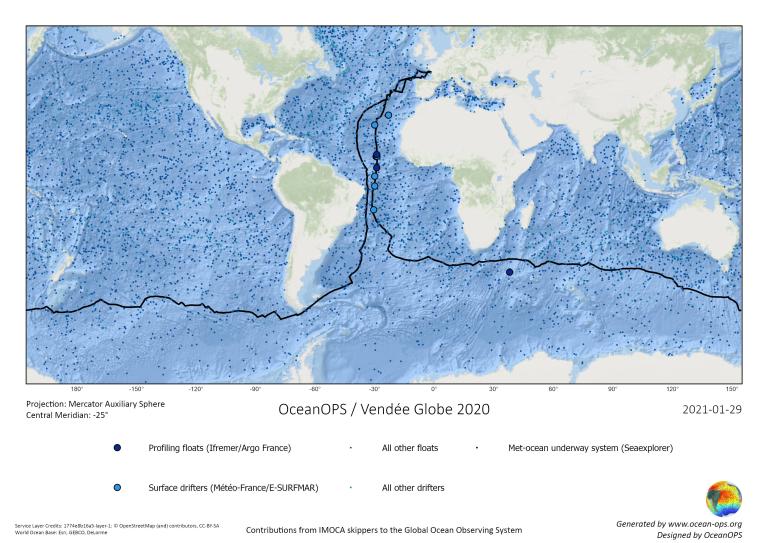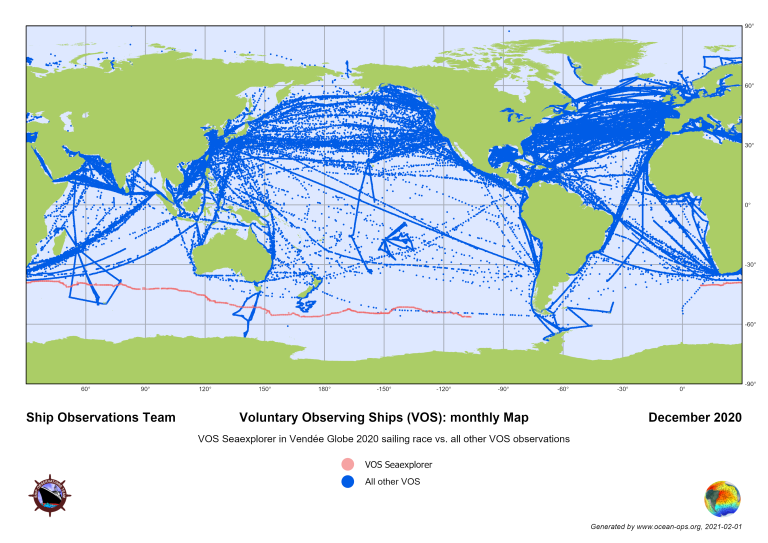Sailing for Science
A new era of sailing for science is beginning, with support for vital ocean observations from the high-profile round-the-world Vendée Globe yacht race. The first of the IMOCA skippers crossed the finishing line at the end of January, after braving equipment failure and stormy conditions. Ten of them took with them scientific instruments including either drifting buoys that gather climatological information or Argo floats that analyse sea water. During the race they deployed all the drifting buoys and almost all the Argo floats at agreed co-ordinates in the Atlantic.

A new era of sailing for science is beginning, with support for vital ocean observations from the high-profile round-the-world Vendée Globe yacht race.

“We cannot stress enough the importance of the oceans, without them there would be no life on earth. As major players in our climate system, they store over 90% of the excess heat from radiative forcing and absorb about a quarter of the human-produced CO2 emitted annually. This is why we are continuing our ocean research mission to protect this incredible wilderness”, says Boris Herrmann, Team Malizia/IMOCA skipper.
The initiative supports the WMO co-sponsored Global Ocean Observing System (GOOS), within the framework of the United Nations Decade of Ocean Science for Sustainable Development (2021-2030). One of the priorities of the Ocean Decade is to ensure a sustainable ocean observing system that delivers timely data and information accessible to all users on the state of the ocean.
Two of the Vendée Globe skippes will participate in the high-level virtual event, “Brave New Ocean”, on 3 February. Organized by the Intergovernmental Oceanographic Commission of UNESCO (IOC), it will highlight the immense challenges and opportunities the ocean provides.
GOOS is a collaborative system of continuous in situ and satellite ocean observations, with thousands of buoys, profiling floats, underwater robots, ship-based sensors and marine mammals, providing essential data for marine and weather forecasts and early warnings, climate studies and ocean health monitoring. It is coordinated by OceanOPS, a joint centre of UNESCO-IOC and the World Meteorological Organisation (WMO).
“The global ocean observing system is under growing pressure to meet the demand for weather and ocean services and forecast products, and climate and ocean health applications,” says WMO Director of Infrastructure Anthony Rea. “The current global Covid-19 pandemic has impacted ocean observing systems and monitoring operations. WMO therefore extends its appreciation and congratulations to the Vendée Globe skippers for their valuable contribution to weather and ocean observations and for Sailing for Science.”
“Real-time ocean observations underpin maritime safety services for seafarers and coastal dwellers as well as improved multi-hazard early warning systems for countless millions of people on land,” says Johann Stander, director of Services at WMO.
Seven meteorological buoys and 3 profiling floats, operated respectively by Météo-France and Argo France, were deployed by the IMOCA skippers at agreed positions in the Atlantic Ocean. Four skippers also carried onboard equipment to measure essential ocean variables such as sea surface salinity, temperature, CO2, atmospheric pressure, as well measure the microplastics pollution at sea. The data collection by these sampling efforts during the Vendée Globe were shared in real-time with international open-source database.

“I have deployed a profiler float leaving the Pot-au-Noir, a shipping route which is usually sparsely navigated. Though the float weighs 20 Kg and keeping extra weight to a minimum is crucial for the race, it is worthwhile. This is my choice. The future of the planet is seriously in danger”, says Louis Burton, Bureau Vallée 2/IMOCA skipper.
Usually, the deployment of ocean observing instruments is done through research oceanographic ships, which are very costly and not able to sail everywhere throughout the ocean regardless of the season. Racing yachts can reach remote and not yet well sampled areas of the ocean, filling critical observational gaps.
“For 10 years now, I have been pledging for the ocean sustainability and protection, and I have been trying to help scientists to better understand the ocean. I have realized that, due to the long period I spent at sea, in very remote oceanic areas, where only a few ships go, I can be really useful for ocean study and preservation. The oceanographic data I have acquired during this Vendée Globe are very rare and precious for the scientists,” says Alexia Barrier, 4myplanet/IMOCA skipper, who deployed an Argo float near the Kerguelen Islands.
Martin Kramp, the Ship Coordinator at OceanOPS, says the Vendée Globe skippers have made an important contribution both to weather forecasts and understanding the health of the ocean. “These instruments help us in areas where we have little means to gather met-ocean data. Observations, such as the atmospheric pressure data acquired by the drifting buoys and transmitted in real-time to the operational centres, help to improve weather forecasting and protect safety of lives at sea, while the high-quality temperature data from profiling floats will enable scientists, throughout the world, to significantly improve the estimates of ocean heat storage” he says.
“About 2,000 autonomous instruments (such as profiling floats and drifting buoys) must be deployed every year to sustain the GOOS. We are calling today, through a specific UN Ocean Decade project, on civil society to support the GOOS implementation and we wish to unlock the potential of the citizens, NGOs, private sphere and of the world class sailors and mariners, some of our best ocean ambassadors”, says Mathieu Belbéoch, OceanOPS Lead.
UNESCO and IMOCA signed the partnership in January 2020 to support ocean science and protection of the ocean. For 2 years, these organisations will carry out various joint projects including met-ocean observations. The racing community is increasingly mobilizing as “sailing ships of opportunity” to gather meteorological data and deploy oceanographic instruments at sea.










